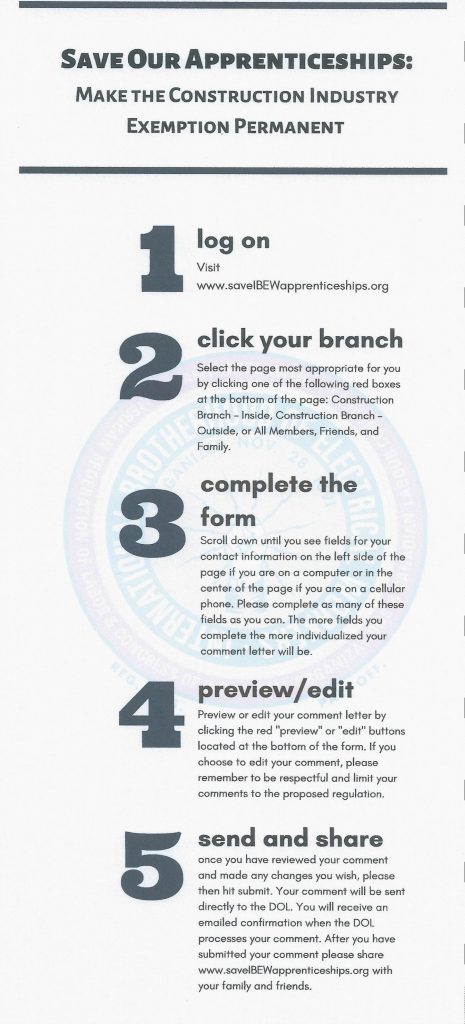 IBEW International President Lonnie Stephenson has issued a call for all IBEW members and their families and friends to mobilize in support of our apprenticeship training programs. These programs are in danger of being undercut by a proposed Department of Labor (DOL) regulation called Industry Recognized Apprenticeship Program (IRAP).
IBEW International President Lonnie Stephenson has issued a call for all IBEW members and their families and friends to mobilize in support of our apprenticeship training programs. These programs are in danger of being undercut by a proposed Department of Labor (DOL) regulation called Industry Recognized Apprenticeship Program (IRAP).
“This proposal establishes a system in which a non-union contractor could recognize its own “apprenticeship program” that would not be subject to many of the same requirements that our DOL-recognized apprenticeships are,” President Stephens said in a letter to all IBEW Business Managers.
“At this time, the construction industry is temporarily exempted from the proposal,” Stephens continued. “However, I am very concerned that this exemption will not be part of the final regulation.”
Along with President Stephens, Local 24 Business Manager Pete Demchuk is asking that all members, regardless of classification, submit comments to the DOL in support of making the construction industry exemption permanent. You can do that in 5 easy steps by going to
www.saveIBEWapprenticeships.org
Building trades unions and our contractor partners spend millions of dollars every year creating the best-trained workforce in the world. Our programs train 75% of all construction apprentices in the U.S. IBEW members complete projects in a safe, efficient manner, using craftsmanship learned through our DOL registered training programs. Don’t let non-union contractors drag down our training and apprenticeship standards!
“While this proposed regulation directly impacts all members of the construction branch, it indirectly impacts all members, their families, and friends. The IBEW prides itself on its electrical ALLIANCE training programs. These programs have graduated hundreds of thousands of journeyman wiremen and journeyman linemen. These individuals are our members; each day they perform their jobs safely and efficiently. They are in part responsible for ensuring our country’s critical infrastructure and emergency response systems are powered. Their training allows them to do so and impacts us all,” Stephens concluded.
